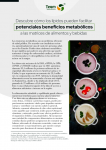Saturated fats not linked to heart disease: Meta-analysis
Data from almost 350,000 subjects obtained from 21 studies indicated that dietary intakes of saturated fat are not associated with increases in the risk of either coronary heart disease (CHD) or cardiovascular disease (CVD), US researchers report in the American Journal of Clinical Nutrition.
“Our meta-analysis showed that there is insufficient evidence from prospective epidemiologic studies to conclude that dietary saturated fat is associated with an increased risk of CHD, stroke, or CVD,” wrote the researchers, led by Dr Ronald Krauss from the Children’s Hospital Oakland Research Institute in California.
“[However,] nutritional epidemiologic studies provide only one category of evidence for evaluating the relation of saturated fat intake to risk for CHD, stroke, and CVD. An overall assessment requires consideration of results of clinical trials as well as information regarding the effects of saturated fat on underlying disease mechanisms, as discussed elsewhere in this issue,” they added.
The study, funded by the US National Dairy Council, Unilever, and the National Institutes of Health, challenges the widely supported theory that saturated fats are detrimental to heart health. The UK’s Food Standards Agency (FSA) has previously stated estimated that if people cut their saturated fat intake to government recommendations it could prevent up to 3,500 premature deaths a year, saving the UK economy more than £1bn a year in related costs.
Such estimates have led to public awareness campaigns in the UK, including a £3.5m advertising campaign to encourage consumers to reduce their intake of saturated fat and change the way they shop and eat.
Business as usual
Commenting on the new meta-analysis, a spokesperson for the FSA told FoodNavigator that the meta-analysis does not challenge the Agency’s saturated fat campaign.
“The Agency recognises that there is evidence to support an indirect link between saturated fat intake and increased LDL cholesterol, which may lead to increased risk of CHD. This is in line with World Health Organization and other eminent health bodies,” said the spokesperson.
“The meta-analysis of prospective cohort studies should be interpreted with caution, as these type of studies are subject to bias and confounding, which may affect the results. Although this meta-analysis reports no association between saturated fat intake and CVD, other recently published combined analyses have found that replacing saturated fat with unsaturated fat, particularly polyunsaturated fat reduces the risk of CVD,” they added.
The spokesperson added that the agency will continue to recommend a reduction in saturated fat intake as part of a healthy balanced diet.
Study details
Dr Krauss and his co-workers searched the scientific literature and indentified 21 prospective epidemiologic studies with data for dietary saturated fat intakes and risk of CHD, stroke, and CVD.
The authors note the limitations of their source studies, stating that: “[Large prospective cohort] studies have caveats, including a reliance on nutritional assessment methods whose validity and reliability may vary, the assumption that diets remain similar over the long term and variable adjustment for covariates by different investigators,” explained the researchers.
“Nonetheless, a summary evaluation of the epidemiologic evidence to date provides important information as to the basis for relating dietary saturated fat to CVD risk,” they said.
Data from 347,747 people showed the development of 11,006 cases of CHD or stroke. No link between saturated fat intake and CHD, stroke, or CVD risk were observed, and this did not change when the researchers focussed their analysis to consider age or sex, or the quality of the study.
“More data are needed to elucidate whether CVD risks are likely to be influenced by the specific nutrients used to replace saturated fat,” concluded the researchers.
Source: American Journal of Clinical Nutrition
Published online ahead of print, doi:10.3945/ajcn.2009.27725
“Meta-analysis of prospective cohort studies evaluating the association of saturated fat with cardiovascular disease”
Authors: P.W. Siri-Tarino, Q. Sun, F.B. Hu, R.M. Krauss












